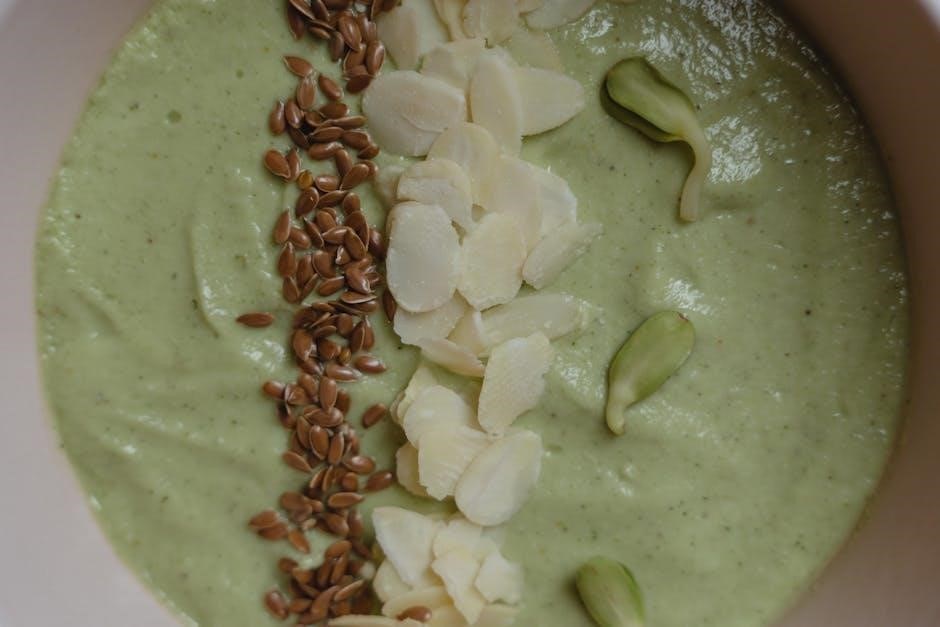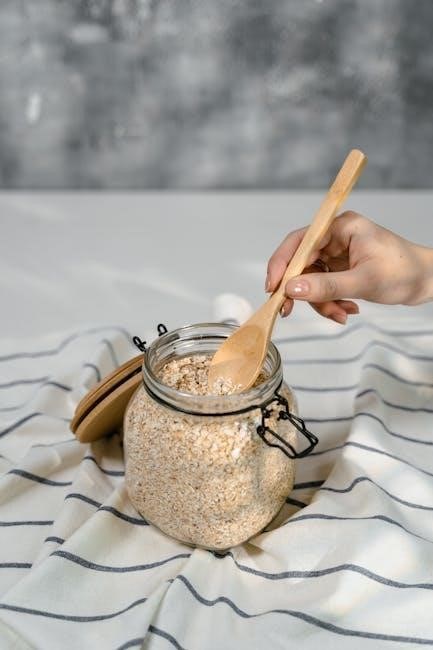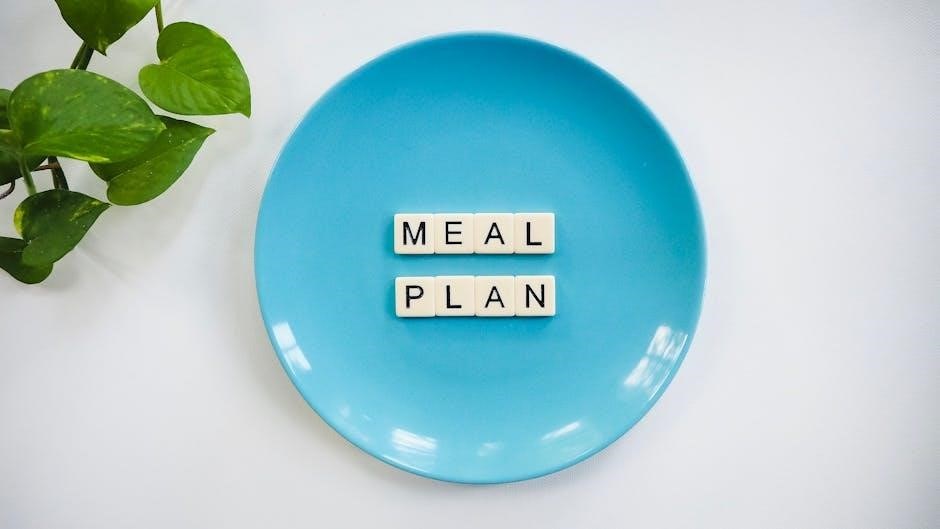
free menopause diet plan pdf
Discover a comprehensive guide to managing menopause symptoms with a free downloadable PDF. This plan offers structured meal ideas‚ hormone-balancing foods‚ and expert tips for a healthier transition.
What is a Menopause Diet Plan?
A menopause diet plan is a tailored nutritional strategy designed to address common symptoms and health concerns associated with menopause. It focuses on balanced nutrition‚ emphasizing foods that support hormone balance‚ weight management‚ and overall well-being. The plan typically includes protein-rich foods‚ fiber‚ and omega-3 fatty acids to reduce inflammation and promote health. By incorporating whole‚ nutrient-dense foods and avoiding processed items‚ it helps alleviate symptoms like hot flashes and supports long-term health goals‚ such as bone density and heart health.
Why is Nutrition Important During Menopause?
Nutrition plays a vital role during menopause due to hormonal changes that can impact health. A balanced diet helps manage symptoms like hot flashes and supports bone health. As hormone levels drop‚ women are at higher risk for osteoporosis and weight gain. Eating nutrient-rich foods‚ including calcium and vitamin D‚ is essential for maintaining strong bones. Additionally‚ a healthy diet supports heart health and reduces the risk of chronic diseases. Proper nutrition also aids in maintaining a healthy weight‚ improving energy levels‚ and promoting overall well-being during this life transition.
Benefits of a Menopause Diet Plan
Embracing a menopause diet plan helps manage symptoms‚ balances hormones‚ supports weight loss‚ and improves overall health. It reduces inflammation and enhances well-being during this transition.
Hormone-Balancing Foods
Hormone-balancing foods are essential for managing menopause symptoms. Include lean proteins‚ whole grains‚ and cruciferous vegetables like broccoli and cauliflower‚ which support estrogen regulation. Omega-3 rich foods like fatty fish and flaxseeds reduce inflammation and stabilize hormones. Phytoestrogens in legumes and nuts also help balance estrogen levels. These foods can alleviate hot flashes‚ mood swings‚ and energy fluctuations‚ promoting overall well-being during menopause. A structured plan ensures you incorporate these nutrients effectively‚ making the transition smoother and healthier.
Weight Management and Weight Loss
Maintaining a healthy weight during menopause can be challenging due to hormonal changes and metabolism shifts. The free menopause diet plan PDF provides strategies to manage weight effectively. By focusing on nutrient-dense foods‚ portion control‚ and mindful eating‚ women can prevent unnecessary weight gain. The plan emphasizes lean proteins‚ whole grains‚ and colorful vegetables‚ which support satiety and metabolism. Structured meal plans and balanced nutrition help reduce cravings and promote sustainable weight loss‚ ensuring a healthier and more confident transition through menopause.
Reducing Menopause Symptoms
The free menopause diet plan PDF offers tailored strategies to alleviate common symptoms like hot flashes‚ night sweats‚ and mood swings. By avoiding triggers such as added sugars‚ alcohol‚ and caffeine‚ women can reduce discomfort. The plan emphasizes anti-inflammatory foods‚ omega-3 fatty acids‚ and hormone-balancing nutrients to ease symptoms naturally. Structured meal plans and nutrient-rich recipes help stabilize hormones‚ promoting a smoother transition and improved overall well-being during this life phase.

Key Components of a Menopause Diet Plan
A menopause diet plan focuses on protein-rich foods‚ fiber‚ and whole grains to support hormone balance and overall health. Incorporating omega-3 fatty acids and nutrient-dense ingredients is essential.
Protein-Rich Foods
Incorporating protein-rich foods into your menopause diet is crucial for maintaining muscle mass and satiety. Sources like lean meats‚ fish‚ eggs‚ dairy‚ and plant-based options such as tofu‚ legumes‚ and nuts are ideal. Protein helps stabilize blood sugar levels and supports hormone balance‚ making it a key component of a menopause-friendly meal plan. Aim to include a variety of these foods in your daily meals to ensure you meet your nutritional needs and support overall health during this transition.
Fiber and Whole Grains
Fiber and whole grains are essential for a balanced menopause diet. They support digestion‚ reduce inflammation‚ and help regulate blood sugar levels. Whole grains like quinoa‚ brown rice‚ and oats provide B vitamins and minerals‚ while high-fiber foods such as fruits‚ vegetables‚ and legumes promote satiety and improve gut health. Incorporating these into your meals can alleviate menopause symptoms like bloating and energy crashes‚ while also supporting long-term heart and bone health.
Omega-3 Fatty Acids
Omega-3 fatty acids play a crucial role in reducing inflammation and supporting heart health during menopause. Found in fatty fish like salmon and mackerel‚ as well as in flaxseeds and walnuts‚ these nutrients help alleviate hot flashes and mood swings. They also support bone health‚ reducing the risk of osteoporosis. Incorporating omega-3-rich foods into your diet can promote overall well-being and ease menopause symptoms‚ making them a key component of a balanced menopause diet plan.

Foods to Include in Your Menopause Diet
Focus on nutrient-dense foods like colorful vegetables‚ fruits‚ beans‚ lentils‚ nuts‚ seeds‚ and whole grains. These support overall health and alleviate menopause symptoms effectively.
Colorful Vegetables and Fruits
Incorporate a variety of colorful vegetables and fruits into your diet to boost vitamin and mineral intake. These foods are rich in antioxidants‚ which help combat inflammation and oxidative stress. Leafy greens like spinach and kale‚ along with vibrant fruits such as berries and citrus‚ support immune function and energy levels. They also play a role in reducing hot flashes and improving bone health‚ making them essential for a balanced menopause diet. Aim for at least five servings daily to maximize their benefits.
Beans‚ Lentils‚ and Legumes
Beans‚ lentils‚ and legumes are rich in fiber‚ protein‚ and phytoestrogens‚ making them ideal for hormone balance and weight management. They help reduce menopause symptoms like hot flashes and support bone health with minerals like calcium and magnesium. Incorporate varieties such as lentils‚ chickpeas‚ and black beans into your meals for a nutrient-dense‚ anti-inflammatory effect. These foods are versatile and can be added to salads‚ soups‚ and main dishes‚ ensuring a balanced and satisfying diet during menopause.
Nuts and Seeds
Nuts and seeds are excellent additions to a menopause diet‚ offering healthy fats‚ protein‚ and fiber. They support weight management and reduce inflammation‚ which can alleviate menopause symptoms. Flaxseeds and chia seeds are particularly beneficial due to their omega-3 content‚ while almonds and walnuts provide antioxidants. Incorporate a variety of nuts and seeds into your meals for a nutrient-rich snack or as a topping for salads and yogurt. Moderation is key‚ as they are calorie-dense‚ but they contribute to overall hormonal balance and satiety.

Foods to Avoid During Menopause
Added sugars‚ alcohol‚ and caffeine can trigger hot flashes and disrupt sleep. Avoid processed foods to minimize inflammation and weight gain during this phase.
Added Sugars
Limiting added sugars is crucial during menopause‚ as high blood sugar levels can worsen hot flashes and energy crashes. Opt for natural sweeteners like fruits or honey in moderation. Avoid sugary drinks‚ pastries‚ and processed snacks‚ which can lead to inflammation and weight gain. Incorporating fiber-rich foods helps stabilize blood sugar spikes. The free menopause diet plan PDF provides practical tips for reducing sugar intake while maintaining flavor and satisfaction in your meals.
Alcohol and Caffeine
Reducing alcohol and caffeine intake is advised during menopause‚ as both can trigger hot flashes and disrupt sleep. Studies show that caffeine and alcohol may exacerbate symptoms like night sweats and mood swings. The free menopause diet plan PDF recommends moderation or elimination of these substances‚ offering alternatives like herbal teas and water. Cutting back on alcohol and caffeine can help alleviate discomfort and support overall well-being during this transition. The guide provides practical strategies to make these adjustments manageable and sustainable.
Processed and Refined Foods
Processed and refined foods‚ such as white bread‚ pastries‚ and packaged snacks‚ should be minimized during menopause. These foods are often high in empty calories‚ added sugars‚ and unhealthy fats‚ which can contribute to weight gain and inflammation. They may also worsen symptoms like hot flashes and energy crashes. The free menopause diet plan PDF recommends replacing these foods with whole‚ nutrient-dense options to support hormonal balance and overall health. Reducing processed foods can help alleviate discomfort and promote a smoother transition during menopause.

Sample Meal Plans for Menopause
Explore structured meal plans designed to support women during menopause. These plans include balanced options like a 4-week schedule‚ 14-day menus‚ and gluten-free recipes for variety and nutrition.
4-Week Meal Plan Structure
The 4-week meal plan provides a detailed and organized approach to nutrition during menopause. Each week is carefully structured to include balanced meals‚ ensuring a variety of nutrient-rich foods. The plan focuses on hormone-balancing ingredients‚ weight management‚ and symptom relief. It incorporates protein-rich dishes‚ fiber‚ and omega-3 fatty acids to support overall health. With clear daily breakdowns‚ this plan simplifies healthy eating‚ helping women navigate menopause with confidence and energy while reducing common symptoms like hot flashes and fatigue.
14-Day Balanced Menu
The 14-Day Balanced Menu offers a concise yet comprehensive approach to nutrition during menopause. This two-week plan provides a structured guide with daily meal ideas‚ focusing on colorful vegetables‚ lean proteins‚ and whole grains. It emphasizes anti-inflammatory foods and avoids added sugars and processed items. Designed to support weight management and reduce symptoms‚ this menu is adaptable to individual preferences. By following this plan‚ women can enjoy balanced nutrition while navigating menopause‚ aligning with the principles of the Mediterranean diet for improved overall health and well-being.
Gluten-Free Meal Options
The Gluten-Free Meal Options within the menopause diet plan cater to those with dietary restrictions‚ focusing on starchy vegetables like sweet potatoes‚ pumpkin‚ and butternut squash. Grains such as rice and quinoa are included‚ ensuring a balanced intake without gluten. This approach reduces inflammation and supports weight management. The plan emphasizes whole‚ unprocessed foods‚ providing versatile and nutritious meal ideas that align with menopause health goals‚ making it easier to maintain a gluten-free lifestyle while managing symptoms effectively.

Additional Resources and Support
Explore free menopause diet resources from UK-based health organizations like the NHS. Discover the Mediterranean diet benefits and download additional guides for perimenopause support‚ all tailored to your needs.
Free Menopause Diet Plan PDF Downloads
Access free menopause diet plan PDFs offering comprehensive guides‚ meal plans‚ and expert tips. These resources‚ available from trusted sources like the NHS‚ provide structured 4-week plans‚ balanced menus‚ and recipe ideas. Designed to support hormonal health‚ they focus on nutrient-rich foods and anti-inflammatory ingredients. Whether you’re managing symptoms or seeking weight loss‚ these downloadable guides simplify your journey. They also include tips for gluten-free options and reducing carbs for better wellness. Download now and start your path to a healthier menopause transition with expert-backed advice.
UK-Based Menopause Diet Resources
The UK offers a wealth of free menopause diet resources to support women through this transition. Organizations like the NHS provide detailed guides‚ meal plans‚ and expert advice tailored to menopause health. These resources emphasize balanced nutrition‚ hormone-friendly foods‚ and lifestyle tips. They often include structured meal ideas‚ recipes‚ and advice on managing symptoms. Downloadable PDFs and online tools are readily available‚ making it easy to access reliable information. These UK-based resources are designed to empower women with practical‚ evidence-based guidance for a healthier menopause journey.
Mediterranean Diet for Menopause
The Mediterranean Diet is highly recommended for menopause‚ focusing on fruits‚ vegetables‚ fish‚ and healthy oils while minimizing processed foods. This diet supports hormone balance‚ weight management‚ and reduces inflammation‚ which can alleviate menopause symptoms. It promotes heart health and bone strength‚ both of which are crucial during this phase. By incorporating Mediterranean principles‚ women can adopt a sustainable eating pattern that enhances overall well-being and eases the transition through menopause naturally and effectively.